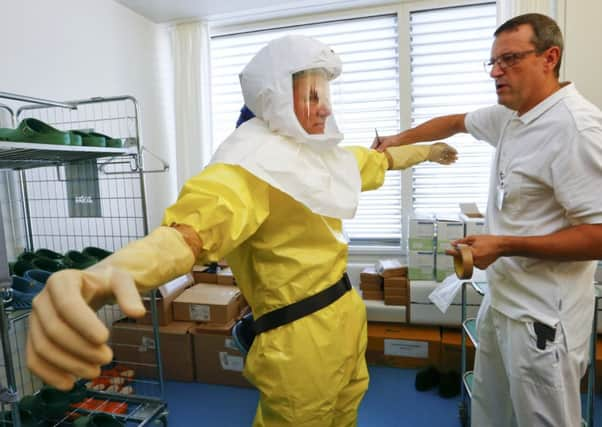Ebola ‘running faster than us and winning the race’


Anthony Banbury, speaking by video-link from West Africa to the UN Security Council, said: “It is running faster than us, and it is winning the race.”
Mr Banbury added that the global response to the Ebola crisis must meet critical goals by 1 December “or face an entirely unprecedented situation for which we don’t have a plan”.
Advertisement
Hide AdAdvertisement
Hide AdBy that date, the world must ensure that at least 70 per cent of people infected are in treatment and at least 70 per cent of burials occur without contamination, he said.
“If we reach these targets, then we can turn this epidemic around,” he told the 15-member council. “I’m grateful for the commitments by member states of civilian and military personnel, of material and of money, but I am deeply, deeply worried that all of this combined is not nearly enough.”
He said that more money is needed to build treatment centres and for more medical personnel to staff them.
“To make up for the gap in beds, we must build about 2,700 beds in community-care centres, or about 300 such centres. We will also need staff to manage the facilities,” Mr Banbury said. “We need to go from about 50 burial teams to about 500 and we need to equip those teams with about 1,000 vehicles.”
The World Health Organisation says the disease has killed nearly 4,500 people, mainly in West Africa – 70 per cent of all people who have contracted the disease.
Sierra Leone, Liberia and Guinea have been hardest hit by the outbreak, which began in December 2013.
Latest projections suggest the infection rate could reach 5,000 to 10,000 new cases a week within two months if global efforts to combat the spread of infection were not stepped up.
WHO assistant director-general Bruce Aylward has said the rate of infections appeared to be slowing in the “historic epicentre” of the outbreak, but warned that it was too early to read this as success.
Advertisement
Hide AdAdvertisement
Hide AdMeanwhile, the director of the US Centres for Disease Control and Prevention, Tom Frieden, has outlined steps designed to stop the spread of the disease, including increased training for healthcare workers and changes at the Texas hospital where the virus was diagnosed to minimise the risk of more infections.
“I wish we had put a team like this on the ground the day the patient – the first patient – was diagnosed. That might have prevented this infection. But we will do that from today onward with any case anywhere in the US,” Mr Frieden said.